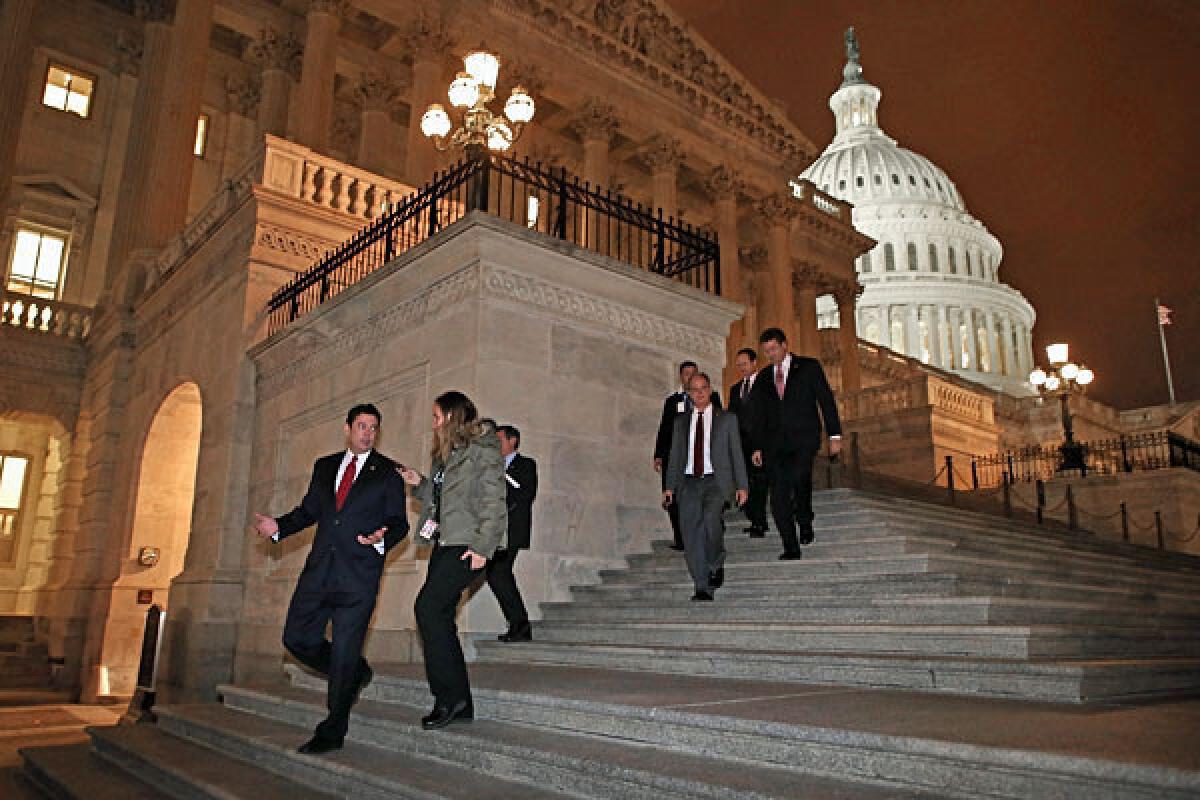‘Fiscal cliff’ deal delivers $64 billion in tax breaks

- Share via
When President Obama signed the “fiscal cliff” legislation, the middle class wasn’t the only group saved from tax hikes.
The new law, which rescinded the automatic tax increases and spending cuts that would have gone into effect beginning Jan. 1, includes 52 “extenders,” legislative extensions of expired or soon-to-expire laws. And many of the extenders benefit interest groups and specific corporations.
The total cost of this package of special giveaways is roughly $64 billion — about $325 for each of the 197 million individual taxpayers in the country.
“This was described as something Congress had to do to save the middle class and save the entire U.S. economy from disastrous consequences,” said Philip J. Holthouse, partner at the Los Angeles accounting firm Holthouse Carlin & Van Trigt. “But it turned into a freight train of tax breaks for rum producers and motorsports complexes and conservation easements.”
Quiz: How well do you remember 2012?
Two years ago, legislators agreed to do away with so-called earmarks, spending programs that benefit interest groups in their districts. But many of these latest tax breaks are just earmarks in disguise, critics say.
“It’s important for people to start recognizing tax deductions and tax loopholes are economically equivalent to spending programs,” said Josh Gordon, policy director with the Concord Coalition, which advocates for a deficit reduction.
Beneficiaries of the breaks often argue that their companies and industries create jobs, and thus the tax benefits are well spent. However, Gordon notes that there has been no real scrutiny of this latest raft of deductions and credits to determine whether American taxpayers are getting a reasonable bang for their buck.
In fact, many of these tax incentives were revived a year after they expired, giving the beneficiaries a retroactive windfall.
Such tax help is supposed to encourage activity that benefits society, but many of the recipients continued the activity anyway despite the loss of incentives, judging by retroactive cost estimates, said David Kautter, managing director of the Kogod Tax Center at American University in Washington.
“Why should we go back and give people a break for something that they were apparently willing to do anyway?” Kautter said.
What exactly are we paying for? Here are some of the highlights.
Multinationals: The law includes $12.7 billion in tax incentives for multinational companies — such as JPMorgan Chase & Co. and Bank of America Corp. — that have financing operations overseas. One break allows these companies to defer U.S. income tax on “active financing income.” The other allows related “controlled foreign corporations” to pay each other money without triggering U.S. tax.
Part of the reason these provisions, now set to expire at the end of 2013, are so expensive is because the “extension” of this tax break stretched back a year, to the end of 2011, when these special tax breaks originally died.
Retail and restaurant developers: A $3.7-billion break will allow accelerated write-offs for qualified leasehold, restaurant and retail improvements.
Venture capitalists: Individuals (and limited partnerships) who buy stock directly from a small corporation with less than $50 million in assets stand to receive $954 million in tax-free gains. Under the “qualified small business” break, investors who hold their stock at least five years receive a 100% tax exemption on gains from the sale of the stock.
Film and TV: The movie industry will get better equipment write-offs from an extension of expired “special expensing” rules. Total cost: $248 million.
NASCAR: Motorsports companies will be able to write off their racetracks faster, at a cost of $78 million to the government, under another break that expired in 2011 but was retroactively revived through 2013.
Coal miners: Sen. Jay Rockefeller (D-W.Va.) scored several credits for his constituents, including a $10,000-per-employee tax credit for training mine rescue workers and one that gets Uncle Sam to partially subsidize mine safety equipment.
In addition, Rockefeller spearheaded the New Markets Tax Credit, an incentive for locating a business in low-income and rural communities, as well as a tax break for companies that make railroad tracks. The four tax breaks have a total cost of $2.1 billion.
Puerto Rico and U.S. Virgin Islands: Revenue from an excise tax that’s imposed on all rum imports is packed up and delivered to the Puerto Rican and U.S. Virgin Islands treasuries. The fiscal cliff law temporarily boosted the rum taxes that could be sent to these U.S. territories by $222 million.
In addition, the law extends a break that allows people who make or sell products in Puerto Rico to deduct 9% of their “qualified production activities” income. Cost: $358 million.
Restaurants: An enhanced charitable deduction for contributing food allows restaurants to deduct twice the cost of the donated food on their tax returns. This provision, which the Joint Committee on Taxation estimates will cost $314 million over the next two years, was originally aimed at encouraging restaurants to provide unused meals to food banks and shelters.
The tax break, which expired in 2011, was retroactively reactivated with a first-year cost of $218 million — about twice the normal one-year cost — indicating that those philanthropic restaurants never stopped donating, regardless of the deduction.
American Indians: It appears that Oklahoma was the big winner when it came to providing tax breaks to Native Americans and those that develop Native American lands. About two-thirds of the state qualifies for special depreciation deductions for locating or expanding a business on former Native American lands. In addition, those who hire a Native American employee can claim as much as $4,000 for each worker in additional tax credits. Total cost: $341 million.
More to Read
Inside the business of entertainment
The Wide Shot brings you news, analysis and insights on everything from streaming wars to production — and what it all means for the future.
You may occasionally receive promotional content from the Los Angeles Times.










